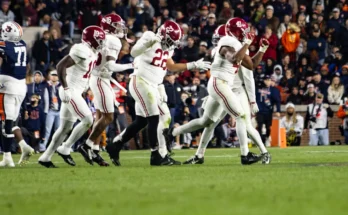Two-Time Gold Glove Winning Former Dodgers Catcher Tucker Barnhart Officially Announces His Sudden Retirement From Major League Baseball
Tucker Barnhart, a two-time Gold Glove-winning catcher and a respected presence behind the plate for over a decade, has decided to retire from Major League Baseball. The announcement came as a surprise to many across the baseball world, with Barnhart quietly stepping away after a 12-year career that saw him play for several clubs, including a recent stint with the Los Angeles Dodgers.
The 33-year-old catcher, known for his steady defense, leadership, and game-calling abilities, leaves behind a legacy defined not by offensive fireworks, but by consistency, durability, and excellence in handling pitching staffs. Barnhart, drafted by the Cincinnati Reds in the 10th round of the 2009 MLB Draft out of Brownsburg High School in Indiana, carved out a career many late-round picks can only dream of.
He made his MLB debut with the Reds in 2014 and quickly established himself as one of the league’s most reliable defensive catchers. His first Gold Glove came in 2017, a season where Barnhart threw out 44% of would-be base stealers, leading the National League and cementing his reputation as one of the game’s premier backstops.
Beyond his defensive prowess, Barnhart earned the respect of his teammates, coaches, and pitchers for his preparation and commitment to managing the game from behind the dish. Pitchers praised his game-calling and ability to control the pace, traits that often fly under the radar but are invaluable to any successful team.
Though not known for his offense, Barnhart contributed timely hits and delivered in crucial moments throughout his career. His career slash line of .242/.320/.360 doesn’t leap off the page, but his ability to grind out at-bats and come through situationally added value beyond the numbers.
After eight seasons with the Reds, Barnhart was traded to the Detroit Tigers ahead of the 2022 season. He later signed with the Chicago Cubs and, in 2024, found himself briefly with the Los Angeles Dodgers organization. Though his time in Los Angeles was short and largely spent in a backup role, Barnhart’s veteran presence was viewed as an asset for a club with championship aspirations.
In his statement announcing his retirement, Barnhart expressed gratitude for the opportunity to live out his childhood dream and reflected on the relationships and experiences that defined his journey.
“Baseball has given me everything I could have asked for and more,” Barnhart shared. “From my days in Cincinnati to wearing the Dodger blue, every moment has been a blessing. The time has come to step away, focus on my family, and begin the next chapter.”
Barnhart’s retirement comes at a time when the role of the defensive-minded catcher has been increasingly scrutinized in a league emphasizing offensive production. Yet his career serves as a reminder that success in baseball isn’t solely measured by home runs or batting averages. It’s often the gritty, unseen work behind the plate — framing pitches, guiding young arms, and managing games — that separates good teams from great ones.
Teammates, former managers, and rivals alike were quick to offer praise following the announcement. Dodgers manager Dave Roberts called Barnhart “a consummate professional” and highlighted the leadership and preparation he brought to the clubhouse.
“Tucker was everything you want in a veteran catcher,” Roberts said. “He made pitchers better, he competed every night, and his work ethic set the tone for younger guys. His impact goes beyond what fans saw on the field.”
Perhaps most telling is the regard with which Barnhart’s pitchers viewed him. Over his 12-year career, countless arms benefited from his steady presence, including All-Stars and rising prospects alike. His ability to read swings, adjust game plans mid-inning, and instill confidence in his battery mates became his calling card.
In an era where the game has evolved dramatically — with pitch clocks, automated strike zones on the horizon, and shifting philosophies about the catcher’s role — Barnhart remained an old-school constant. His attention to detail and defensive skillset earned him widespread respect, even if he was never the flashiest name on the roster.
His first Gold Glove season in 2017 marked a high point individually, but Barnhart consistently prioritized team success over personal accolades. He won a second Gold Glove in 2020 during the pandemic-shortened season, further underscoring his reputation as one of the league’s defensive anchors.
While the final seasons of his career saw reduced playing time and offensive struggles, Barnhart’s value to contending teams like the Dodgers remained clear. His role as a mentor to younger players, both on and off the field, carried significant weight in veteran-laden clubhouses.
Reflecting on his decision to retire, Barnhart pointed to the physical demands of catching and a desire to spend more time with his family as key factors.
“Catching takes a toll on your body, and I’ve been fortunate to stay relatively healthy,” Barnhart said. “But at this point in my life, being present for my family and exploring new opportunities feels like the right choice.”
Indeed, the grind of crouching behind home plate for over a decade is no small feat. Catchers endure one of the most physically punishing roles in professional sports, with every game testing their endurance, reflexes, and durability. For Barnhart to have logged over 850 games behind the plate speaks volumes about his toughness and resilience.
While Barnhart never reached the heights of perennial All-Star status, his contributions were felt in every clubhouse he entered. His leadership, preparation, and defensive reliability left an imprint that many young catchers aspire to replicate.
His retirement adds to a wave of veteran catchers stepping away from the game in recent seasons, as teams increasingly turn to younger, more offensively inclined options. Still, the void left by players like Barnhart — steady, unselfish, defense-first leaders — is hard to fill.
As for what’s next, Barnhart hinted at staying connected to the sport that shaped his life, potentially through coaching, broadcasting, or player development roles.
“Baseball will always be part of me,” Barnhart said. “I love teaching the game, I love talking about the game, and I’m excited to see how I can stay involved, whether that’s coaching, mentoring, or something new.”
For now, though, the Indiana native plans to enjoy quality time with his wife and children, a well-deserved respite after the grind of professional baseball.
Fans across Cincinnati, Detroit, Chicago, and Los Angeles have already begun sharing messages of appreciation, reflecting on Barnhart’s quiet but meaningful impact across multiple organizations. From his defensive excellence to his clubhouse leadership, Tucker Barnhart retires as one of the game’s respected veterans — a player who maximized his potential, stayed true to his craft, and earned the admiration of teammates and opponents alike.
His departure leaves another reminder that while stars often grab headlines, it’s players like Barnhart — selfless, steady, and driven — who form the backbone of successful baseball teams. And as one chapter closes for the veteran catcher, the baseball world will be watching to see what contributions he brings to the game’s next generation.



